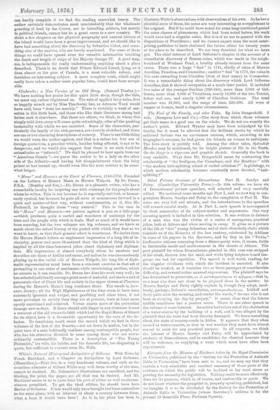Select Private Orations of Demosthenes. Part II. Sandys and Paley.
(Cambridge University Press.)—In this volume we have six of Demosthenes' private speeches, well selected and very carefully edited. We reviewed some months ago Part L, and wo now beg to con- gratulate Messrs. Sandys and Paley on the completion of Part IL The notes are very full and minute, and the introductions to the speeches will reward careful study. As in Part I., each speech is accompanied by short summaries of its subject-matter and arguments. One very amusing speech is included in this selection. It was written in defence of a man who was the victim of a series of outrageous, practical jokes, both at Athens and when serving in camp. It gives us a picture of the life of "fast" young Athenians and of their disorderly clubs which reminds us of the Mohocks of the last century, celebrated by Addison in some of his papers in the Spectator, and by Gay in his "Trivia." Inoffensive citizens returning from a dinner-party were, it seems, liable to intolerable insult and maltreatment in the streets of Athens. The poor plaintiff for whom Demosthenes pleaded in this case was stripped of his cloak, thrown into the mud, and while lying helpless hoard lan- guage too bad for repetition. The speech is well worth reading, for the singular vividness with which the incident is narrated. It also should be studied, as it contains two or three passages of considerable difficulty, and several rather unusual expressions. The plaintiff says he has determined to prosecute, ce; sL xcerscrropxturiopsvac To 17avyths,—that is, as a man who does not chose to be perjured down in the matter. So Messrs. Sandys and Paley rightly explain it, though tkoy adopt, need- lessly, perhaps, Dobroo's emendation, sargrrapxffi9ne4ciros. Liddell and Scott quite miss the moaning, and render the words," As one who is not bent on carrying the day by perjury." It seems clear that the future middle sometimes has a passive sense. There is one other speech in the volume of some interest. An action had arisen out of the obstruction of a water-course by the building of a wall, and it was alleged by the plaintiff that his farm had been thereby damaged. Wo learn something about the state of country-roads in Attica. It appears that they often served as water-courses, so that in wet weather they must have almost ceased to exist for any practical purpose. In all respects, we think the labours of Messrs. Sandys and Paley will be appreciated by students of Demosthenes, and to candidates for classical honours they will be welcome, as supplying a want which mast have often been experienced.


































 Previous page
Previous page